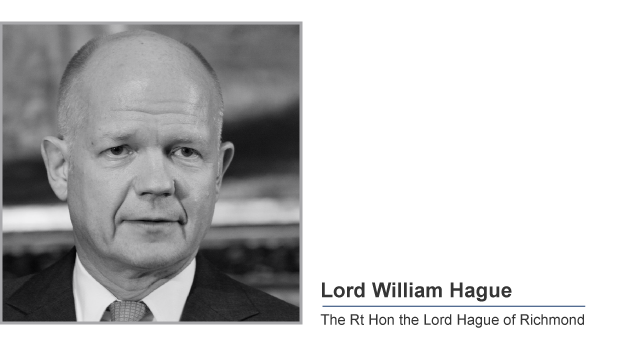
Lord Hague was first elected to Parliament for the seat of Richmond, North Yorkshire, at a by-election in 1989. At 27 years old he was the youngest Conservative Member of Parliament. He was re-elected a further five times to Parliament, on the last three occasions with the largest margin for any Conservative in the country.
Within two years of entering Parliament Lord Hague had become Parliamentary Private Secretary to the Chancellor of the Exchequer. In 1993 he became Parliamentary Under-Secretary of State at the Department of Social Security. He was promoted the following year to Minister of State with responsibility for Social Security and Disabled People. He introduced the landmark Disability Discrimination Act in 1995.
Prime Minister John Major appointed him Secretary of State for Wales in the same year making him, at 34, Britain’s youngest cabinet minister since Harold Wilson in 1947.
Lord Hague became leader of the Conservative Party after the 1997 General Election, making him, at 36, the youngest leader of a major political party in the United Kingdom in 200 years.
He set about reforming his party, including giving local party members a decisive say in future leadership elections. He led his party to victory in the European elections of 1999 and was widely credited for leading a successful campaign against the country joining the Euro. He stood down as leader following the re-election of Tony Blair at the 2001 General Election.
Lord Hague led the negotiations with the Liberal Democrats following the 2010 General Election that led to the creation of the Coalition Government. During his tenure as Foreign Secretary, Lord Hague dealt with one of the most tumultuous periods in modern history with unrest across the Middle East, and crises in Europe.
He set about reviving the Foreign and Commonwealth Office, opening new embassies in Latin America and Africa, expanding Britain’s presence in China and India, re-opening the language school, establishing the Diplomatic Academy, and personally visiting 83 countries.
In 2012 Lord Hague launched the Preventing Sexual Violence Initiative with UN High Commissioner for Refugees, Angelina Jolie Pitt, to address the culture of impunity that exists for crimes of sexual violence in conflict, and increase the number of perpetrators held to account.
After four years as Foreign Secretary, in July 2014 he declared his intentions to step down from front-line politics at the 2015 General Election, becoming Leader of the House of Commons in his final 10 months in Government, and retaining his position as First Secretary of State.
Lord Hague has written two very successful and critically acclaimed political biographies: of William Pitt the Younger, which won the History Book of the Year prize in 2005, and William Wilberforce: The Life of the Great Anti-Slave Trade Campaigner. He is a fortnightly columnist for The Daily Telegraph.
On 17th September 2015 Lord Hague became a director of Intercontinental Exchange Inc. He is also a member of ICE Futures Europe and became its chair on 1st January 2016. His other business interests include chairing the International Advisory Group of Linklaters LLP, a leading global law firm, and he is a Senior Adviser to global advisory firm Teneo. From September 1st he has chaired the security and defence think-tank, the Royal United Services Institute. In January 2017 Lord Hague became a Senior Adviser to Citi Group.
Lord Hague is currently chairing the United for Wildlife Taskforce which is tackling the trafficking of illegal wildlife products, as part of a collaboration of seven conservation organisations and The Royal Foundation. In March 2016 he was made an Honorary Fellow of Magdalen College, Oxford.
